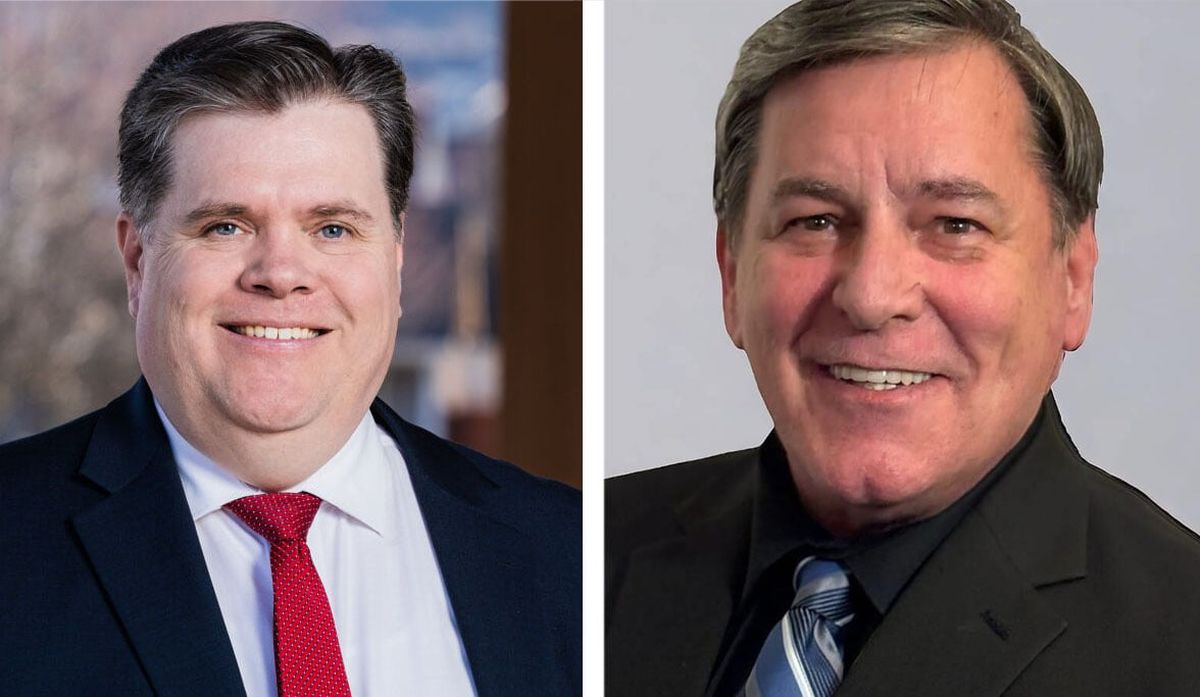Former Deputy Sheriff Jody Spurgeon, Deputy Prosecutor Matthew Welde join race for Congress

Two more candidates, a Republican and a Democrat, have joined the throng of people hoping to win a seat representing Eastern Washington in Congress, bringing the total running to 12.
Jody G. Spurgeon, a retired law enforcement officer, filed with the Federal Elections Commission on March 22 to run as a Republican. Matthew Welde, a deputy prosecuting attorney in Kootenai County, filed with the FEC on March 3 to run as a Democrat. Both published campaign websites in the last two weeks.
Spurgeon is now the eighth Republican hoping to replace Rep. Cathy McMorris Rodgers, who announced in February that she would not be running for re-election in the state’s 5th Congressional District. Welde is the fourth Democrat in the race.
Spurgeon
Spurgeon retired in 2016 after a workplace injury ended a nearly 30-year career in law enforcement, primarily as deputy sheriff of Ferry County, with shorter stints as an officer with the Chewelah Police Department and as town marshal of Republic.
“As far as retirement goes, boy it’s boring,” Spurgeon quipped in a Tuesday interview. “I thought about politics and here I am. Decided to go for it and put my energy towards helping people and helping the country.”
He highlighted two priorities if he was elected to Congress: supporting veterans and law enforcement officers.
Spurgeon, a graduate of Ferris High School in Spokane, comes from a military family with members who served in World War II and Vietnam. He enlisted into the Army in 1975 after graduation but was medically discharged due to having flat feet.
Some of the veterans in his family have had to wait an unconscionably long time to receive medical care through the Veterans Affairs system, he said. It’s an issue he would like to address in D.C.
“My father-in-law, when he goes to the VA hospital, he has to wait months to get in there,” Spurgeon said. “They didn’t wait months to go overseas to fight for us.”
For law enforcement, Spurgeon said politicians and the public should do more to support the police with both resources and in the face of criticism.
“They need better equipment. They need better training. They need the public to stand behind them,” he said. “Officers all over need to know that, should the unthinkable happen, that we are going to stand behind them. Things can come out during an investigation, but at least stand behind them while that’s going on.”
Spurgeon also believes that the U.S.-Mexico border should be closed for an intermediate period, and that solving immigration and trafficking issues would significantly reduce crime and help officers in the states.
“We need to close the border completely until we get a plan that will work,” he said.
He added that he would support the border control provisions currently stalled by Republicans in Congress, but argued that they shouldn’t have been folded into a sweeping package that includes aid to Ukraine and other U.S. allies. While he said that he might support sending aid, he philosophically disagrees with the common practice in D.C. of pairing disparate, major issues into the same package, arguing that issues should be voted on separately.
Welde
Welde’s 14-year career in criminal prosecution has had a focus on domestic violence cases nearly since the beginning, due to how strongly he felt about prosecuting abusers who manipulated their victims, he said in a Tuesday interview.
“I saw, here is a person in a difficult situation, the person they’re with that should care about them as a partner, not only abuses them, but also hides behind them,” Welde said. “It did not take long before I had a passion for it.”
Welde was born in Virginia and moved regularly before landing a job as an assistant district attorney in Oklahoma. He moved to Washington and started working as a deputy prosecutor in Spokane County in 2018, moving to the Kootenai County Prosecutor’s Office last year.
He highlighted four priorities for Congress, including affordability, public safety, reproductive rights and health care.
Welde argued that the Supreme Court’s Dobbs decision, which ended the nationwide right to access abortion, was wrongly decided on both moral and legal grounds. He said he would fight to pass national protections for the procedure.
“I’ve been a supporter and a fighter for women’s rights for a long time, and reproductive rights are just another area of women’s rights,” he said.
Welde said he was a strong proponent for a centralized health care system, and while he was not “married to single-payer,” he believed that the United States should look to countries like France or Switzerland for inspiration.
“The people that live in these countries really like these systems,” he said. “That’s not the case here.”
Consolidating various government-run health care systems, such as those run by the federal and state governments, would reduce bureaucracy and cut costs, allowing the government to spend more money on outcomes and less on administration. He particularly disagrees with a system of health insurance paid for by employers, arguing that it created an unnecessary cost for small and medium businesses.
Like Spurgeon, Welde said law enforcement needs more resources for training and equipment, both to improve public safety and to improve people’s confidence in law enforcement.
He also argued that the federal government has a major role to play in improving the economy and affordability for the average American.